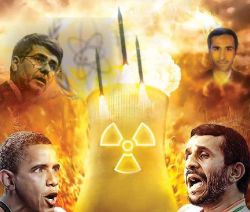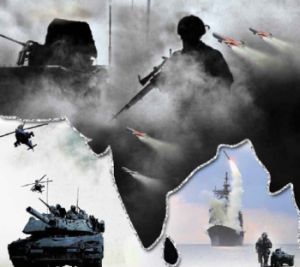A war has begun in Iran; a combination of covert action, economic sanctions, political isolation and the threat of military pre-emption have not just crippled the Iranian economy but have checkmated Iran’s war waging potential. The threat of unleashing an asymmetric conflict is more pressure tactics than a credible denial strategy. Critical aspect is assessing Iran’s ability to close the Gulf as threatened periodically. Iran and especially the naval elements of its Revolutionary Guard Corps, has sought to develop a unique denial naval force based largely upon flotillas of fast, attack crafts backed up by a variety of crafts capable of laying mines, conventional and midget submarines. These are supported by shore-based anti-shipping missiles, aircraft, rockets and artillery all with rudimentary command and control. However they are not equipped materially nor technologically for any sustained denial operations when up against US and coalition forces. What they could achieve is disruption through low level sporadic attacks on shipping. Whether Iran has the political sagacity to cope with the current situation without giving opportunity for the US to take recourse to arms is a moot question. And what of the strategy of despair: terror?
 |
| Click to enlarge |
On the morning of 29 November 2010 the Iranian nuclear physicist Majid Shahriari was working his way on Artesh Street in central Tehran when a motorcycle pulled up alongside his sedan, stuck a metallic object and sped away. Within moments a shaped charge tore through the door and left the scientist a mangled mass of flesh. The scientist died instantly. Some twenty kilometres northward and a few minutes later in the foothills of the Alborz Mountains close to the Pas-e-Qaleh neighbourhood another motorcyclist drove up to the car of Fereydoun Abbasi Davani and placed his explosive, only this time the victim managed to get out of the car to safety before the bomb went off. Abbasi was a leading ballistic missile scientist. It was also the same day that Iranian President Ahmadinejad admitted that software that controlled high speed centrifuges used to enrich uranium for nuclear reactor fuel and (possibly) to weapon grade levels had been damaged in cyber attacks.
Wars through the ages occur when the established order is challenged and this challenge is resisted; and as Clausewitz so one-dimensionally put it “wars take place mainly for the defender”. But the trigger has varied from declaration to direct military action and sometimes more insidiously through covert action or by political riddance. In each case, empires and dispensations had fallen through erosion of the founding canon, that of obligation of the citizenry. Sometimes this occurs rapidly due to sheer weight of an intervening power or due to a slower process of exhaustion of internal energies. The nature of war that we are currently witness to in Iran does not readily fall into any mould. Covert action, cyber attacks and political alienation sufficiently reinforced by economic sanctions and intrusive nuclear inspections on the one hand, has unleashed globally disruptive nationalism on the other. Potentially a far more dangerous effect is what nations over the last century have turned to, the strategy of despair: terrorism.
 |
| Here you can find more information about: |
Sanctions and the coming oil shock
The UN ratified four rounds of sanctions against Iran between 2006 and 2010 in reaction to its refusal to halt uranium enrichment and co-operate with the International Atomic Energy Agency (IAEA). These sanctions include a ban on the supply of heavy weaponry and nuclear-related technology to Iran, a block on Iranian arms exports and an asset freeze on key individuals and companies. Resolution 1929, passed in 2010, mandates cargo inspections to detect and stop Iran’s acquisition of illicit materials. The European Union (EU) has imposed its own restrictions on trade in equipment which could be used for uranium enrichment and has put in place an asset freeze on a list of 39 individuals and 141 companies and organisations which it believes are helping advance the country’s nuclear programme. On 23 January 2012, EU approved a ban on imports of Iranian crude oil, a freeze of assets belonging to the Central Bank of Iran and a ban on all trade in gold and other precious metals with the bank and other public bodies. The EU currently buys about 20 per cent of Iran’s oil exports.
This article is published with the kind permission of “Defence and Security Alert (DSA) Magazine” New Delhi-India
The Strait of Hormuz is one of the most critical maritime chokepoints of the contemporary global energy system. Through its narrows (less than 34 miles) close to 18 mbl of oil, a fifth of global consumption, courses through every day along two, 2 mile wide shipping lanes carried onboard 5,800 hulls (approx) annually (all figures sourced from Energy Information Administration, USA). The north and eastern side of the strait is dominated by the Iranian coastline while the southern side by Oman and the United Arab Emirates. Traffic density is high and well regulated, the waters are shallow and do not favour submarine operations and the constricted nature of the seaway does not support large scale stealth operations or large force manoeuvres. The Gulf nations produce nearly 30 per cent of global oil while sitting on 57 per cent of the world’s crude reserves. It is also the repository of 45 per cent of proven world gas reserves
 |
| Click to enlarge |
The other economies that are likely to take the brunt of denial are China, Japan and South Korea. In the end analysis, restoration of oil supplies from Libya and Iraq and controlled ramping up of Saudi oil production serves to stabilise prices and for the western markets and replace EU dependence on oil sourced from Iran. Control of Libyan and Iraqi oil not only provided the strategic logic for the recent wars in these two nations, but also presents a convincing argument to answer one of the critical elements for a possible war in Iran. It is therefore hardly any surprise that Libya today globally exports 1.4 mbl / day and Iraq 2 mbl / day of which 20 per cent goes to the EU which amounts to 6,80,000 bl / day against 4,30,000 bl / day that was coming from Iran (all figures in this section sourced from Global Trade Atlas and Energy Information Administration, USA). So as far as energy security is concerned, a war in Iran will raise not only anxiety levels amongst the eastern economies, but will rack these markets through another oil shock
The USA has long-standing comprehensive sanctions in place on Iran. Since 1980 the US has imposed successive rounds of sanctions, citing what it says is Iran’s support for international terrorism, human rights violations and refusals to co-operate with the IAEA. The US sanctions prohibit almost all trade with Iran, making some exceptions only for humanitarian activity. In late November 2011 the US, UK and Canada announced more bilateral sanctions on Iran, in reaction to an IAEA report which suggested Iran’s nuclear programme may have a military purpose. The US expanded sanctions to target companies that aid Iran’s oil and petrochemical industries. Other countries including Switzerland, Japan, Australia and Canada have also imposed bilateral sanctions on Iran in recent years in response to Iran’s lack of co-operation with the IAEA. A US law signed on 31 December 2011, imposed new sanctions on financial institutions dealing with Iran’s central bank. The law is intended to hamper Tehran’s ability to sell oil abroad. A fall in Iran’s oil exports would not only have a big impact on the Iranian economy but its fall out could drive up the global oil price and harm global economies.
The EU’s ban of 23 January on imports of Iranian crude oil, is expected to have a more significant impact on the economy of the Islamic Republic, because the EU currently buys about a fifth of Iran’s oil exports. Japan and South Korea, which together account for 26 per cent of Iran’s oil exports, are non-committal as yet. The sanctions are designed to bring the Iranian economy to its knees. The grim realities of its effects are there for all to see as the Rial has dropped close to 70 per cent against the US dollar in recent months.
Russia has rejected any further sanctions against Iran. China and India have indicated that they do not intend to curb Iranian oil imports. Turkey, too, has signalled that it will not adopt any oil embargo.
Impact of sanctions on energy security
In order that the perspective is not lost sight of, the reader must come to grips with what universal sanctions will mean to the world particularly in the oil sector and how its denial will influence global energy security in general terms with specific reference to the Indian situation. Table 1 below makes a graphic statement of Iran’s oil export destinations. When viewed against the total world consumption of 86 million barrels / day (mbl / day), Iran’s exports amount to about 2.5 per cent of global needs. However this does not give a wholesome picture of the situation. The largest consumer of oil, the USA, which accounts for over 25 per cent of global consumption does not import any oil from Iran; and as far as the EU is concerned, 20 per cent of Iran’s exports is destined to European consumers of which close to 15 per cent goes to the weaker economies of Italy, Spain, Greece and Turkey for whom alternative sources are being put in place. The graphic, then, makes it amply clear that it will be the eastern economies that will be sorely hit by a denial regime.
India is the world’s 4th largest oil consumer at 3.5 mbl / day, which represents 4 per cent of global use and the amount that it imports from Iran is 3,44,640 bls / day against a total import of 3 mbls / day which approximates 11.5 per cent (all statistics in this section are sourced from the US Energy Information Administration, International Energy Statistics). Given these figures any disruption in supply or attempt to find alternative sources will have serious adverse impact on an already strenuous economic growth to the extent of one to two per centage points (writer’s estimate). The other economies that are likely to take the brunt of denial are China, Japan and South Korea.
In the end analysis, restoration of oil supplies from Libya and Iraq and controlled ramping up of Saudi oil production serves to stabilise prices and for the western markets and replace EU dependence on oil sourced from Iran. Control of Libyan and Iraqi oil not only provided the strategic logic for the recent wars in these two nations, but also presents a convincing argument to answer one of the critical elements for a possible war in Iran. It is therefore hardly any surprise that Libya today globally exports 1.4 mbl /day and Iraq 2 mbl / day of which 20 per cent goes to the EU which amounts to 6,80,000 bl / day against 4,30,000 bl / day that was coming from Iran (all figures in this section sourced from Global Trade Atlas and Energy Information Administration, USA). So as far as energy security is concerned, a war in Iran will raise not only anxiety levels amongst the eastern economies, but will rack these markets through another oil shock.

 von
von 

